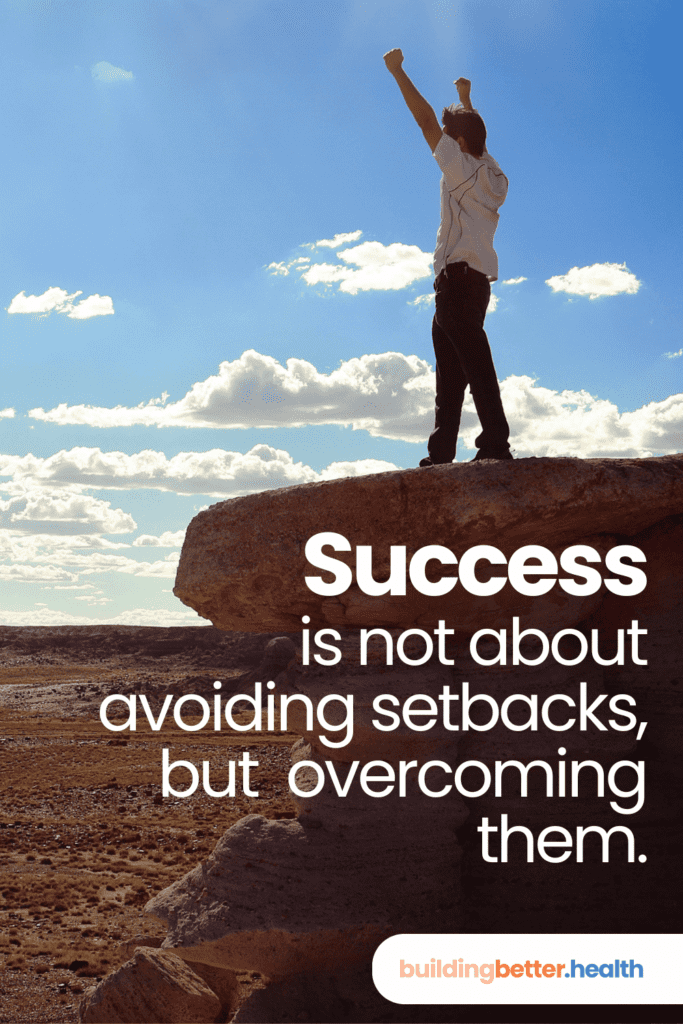
Please note: This website contains affiliate links. As an Amazon Associate, we earn from qualifying purchases at no additional cost to you.
Let’s be honest: we all have those days where things just don’t go as planned. Maybe you missed a workout, gave in to a craving, or just felt too drained to stick to your routine. These “off” days can make you feel like you’re failing, but here’s something I want you to remember: setbacks are part of the journey. They’re completely normal, and they don’t define you or your progress.
In fact, what if we looked at setbacks as opportunities for growth? With the right mindset, each of these moments can teach us something valuable and even make us stronger in the long run. Today, let’s talk about some ways to shift our mindset around setbacks and turn them into powerful comebacks!

1. Recognizing Setbacks as Part of the Journey
First things first: setbacks are not a sign that you’re failing. They’re actually a natural part of any growth process. No journey, especially a health or fitness journey, is perfectly linear. You’re going to have days that don’t go as planned, and that’s okay. The key is to see these moments as small detours rather than dead ends.
Imagine this: you have a goal to work out five days a week, but one day you’re exhausted and skip your workout. Instead of beating yourself up, try to remember that this is a single day in a larger journey. Think of it as part of the process, like a “pause” button rather than a “stop.” Every person who’s worked toward a goal has experienced setbacks along the way, and they’ve used those moments to learn and grow. You can do the same.
2. Reframing Setbacks as Learning Opportunities
Here’s a little mindset trick: instead of thinking of setbacks as failures, what if we saw them as chances to learn? This small shift can completely change how you approach your “off” days. When something doesn’t go as planned, try replacing self-criticism with curiosity.
For example, if you had a rough day at work and ended up stress-eating, ask yourself a few simple questions: What was I feeling in that moment? Was there something specific that triggered me? Is there something I could try next time to handle that feeling differently? By reflecting on these questions, you’re turning a setback into self-awareness.
Let’s break down an example. Say you missed a workout because you felt exhausted after a long day. Instead of labeling it a failure, take a moment to ask yourself why you felt so tired. Was it a lack of sleep the night before? Maybe you’ve been pushing yourself too hard without enough rest. These questions aren’t about criticizing yourself; they’re about discovering patterns and making adjustments to support your well-being. That’s where real growth happens.
3. Practicing Self-Compassion
Here’s a little reminder: setbacks are a time to show yourself kindness, not criticism. Being compassionate with yourself doesn’t mean making excuses; it means recognizing that everyone has tough days and that you’re human. Practicing self-compassion can actually help you bounce back faster because it keeps your mindset positive and constructive.
Imagine a friend coming to you and saying, “I really messed up today. I didn’t stick to my plan.” You’d probably tell them it’s okay, right? That one day doesn’t define their entire journey. Try giving yourself that same grace. On an “off” day, take a moment to say something like, “It’s okay. I’m doing my best, and I’ll keep moving forward.” This small act of kindness can make a huge difference in how you feel and help you approach tomorrow with a clear mind.
Self-Compassion Exercise: When you’re feeling down about a setback, take a moment to pause and acknowledge your feelings without judgment. Say something to yourself like, “I had a tough day, and that’s okay. Tomorrow is a new chance to try again.” This tiny shift can keep you from spiraling into self-doubt and help you stay focused on progress.
4. Making a Comeback Plan
Now that you’ve shifted your mindset, it’s time to make a comeback plan. One of the best ways to bounce back is by setting small, achievable goals that help you rebuild momentum. Big goals can feel daunting, especially after a setback, so start with something simple.
Let’s say you skipped your workout. Instead of feeling like you have to “make up” for it with an intense session, set a smaller goal for the next day, like a 10-minute walk or some stretching. By doing something small, you’ll still feel accomplished and get back into the habit. Small wins build momentum and remind you that you’re still moving forward.
Another tip is to look for positives, even on challenging days. Maybe you stayed hydrated, took the stairs, or cooked a healthy meal. Recognizing these little victories keeps your focus on the things you are doing right, which can motivate you to keep going.
Example Comeback Plan: Start with one small action, like preparing a healthy snack or doing a 5-minute stretch. These mini-goals help you reset and reinforce the positive actions that keep you moving forward.
5. Tracking Progress and Celebrating Comebacks
Tracking your progress is a great way to remind yourself of how far you’ve come—even when you have setbacks. Start a habit of jotting down each comeback in a journal, like a mini “resilience log.” Every time you bounce back, write it down. Over time, you’ll have a record of all the times you’ve turned setbacks into comebacks, which can be incredibly motivating.
And don’t forget to celebrate! Recognize and appreciate the effort it takes to get back on track, even in small ways. Every comeback is a sign of resilience, and that’s worth celebrating. These little celebrations don’t have to be big—maybe it’s a relaxing bath, a favorite book, or just a moment to feel proud of yourself.
Example of Progress Reflection: At the end of each week, take a few minutes to look back and note one or two times you overcame a setback. Recognizing your resilience over time helps you see that setbacks don’t stop you; they just make you stronger.
Conclusion
Setbacks are a natural part of any journey. They don’t define us—instead, they offer opportunities to learn, grow, and become more resilient. By recognizing setbacks as learning experiences, practicing self-compassion, setting small comeback goals, and tracking your progress, you’ll find that these “off” days are just stepping stones in your journey.
So, the next time you face a setback, remember: it’s just one moment, and tomorrow is another chance to try again. Embrace the lessons these moments offer, and keep moving forward. And hey, if you feel like sharing, drop a comment below about a recent comeback you’ve made—I’d love to celebrate your resilience with you!

Please note: This website contains affiliate links. As an Amazon Associate, we earn from qualifying purchases at no additional cost to you.










